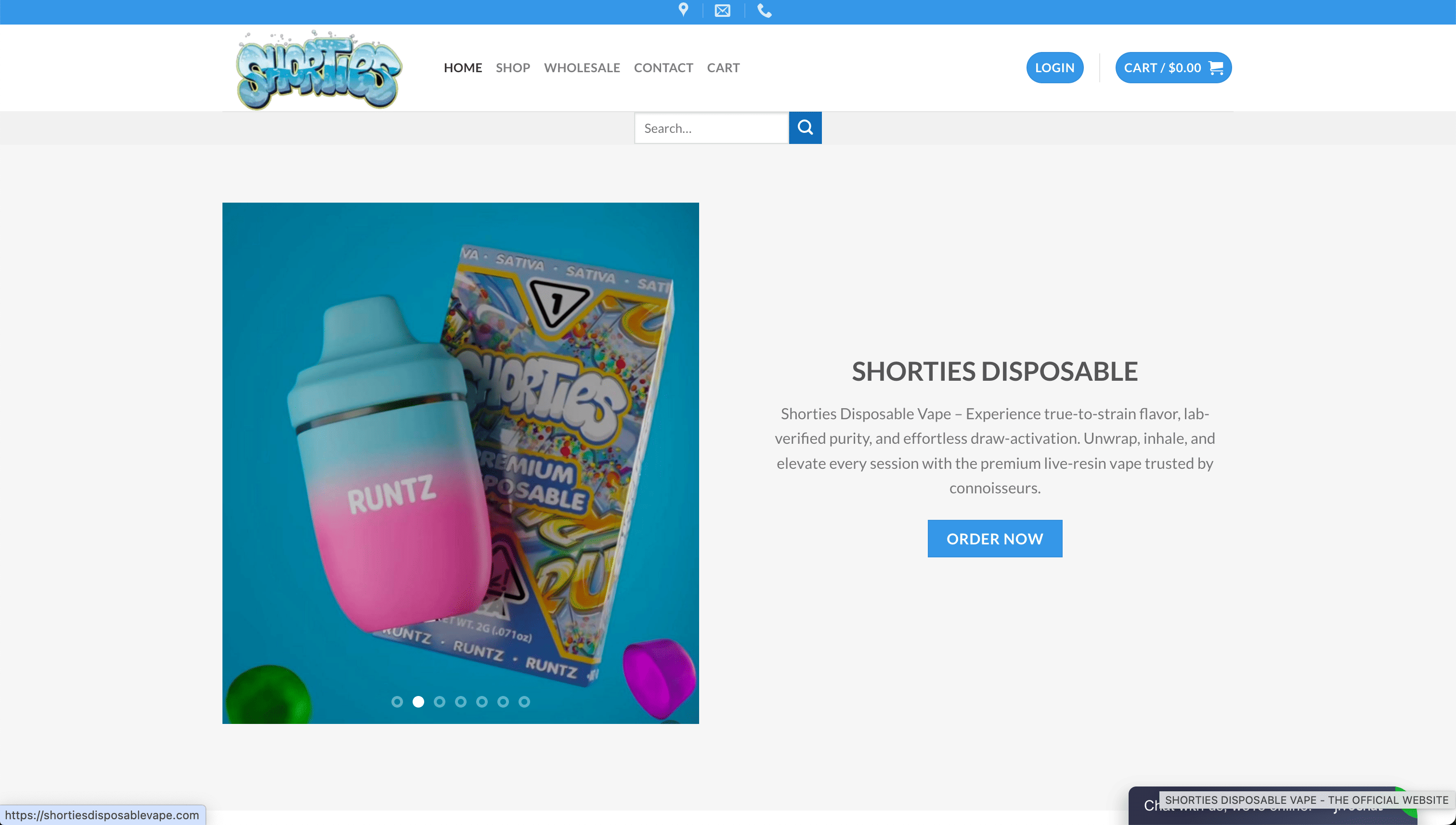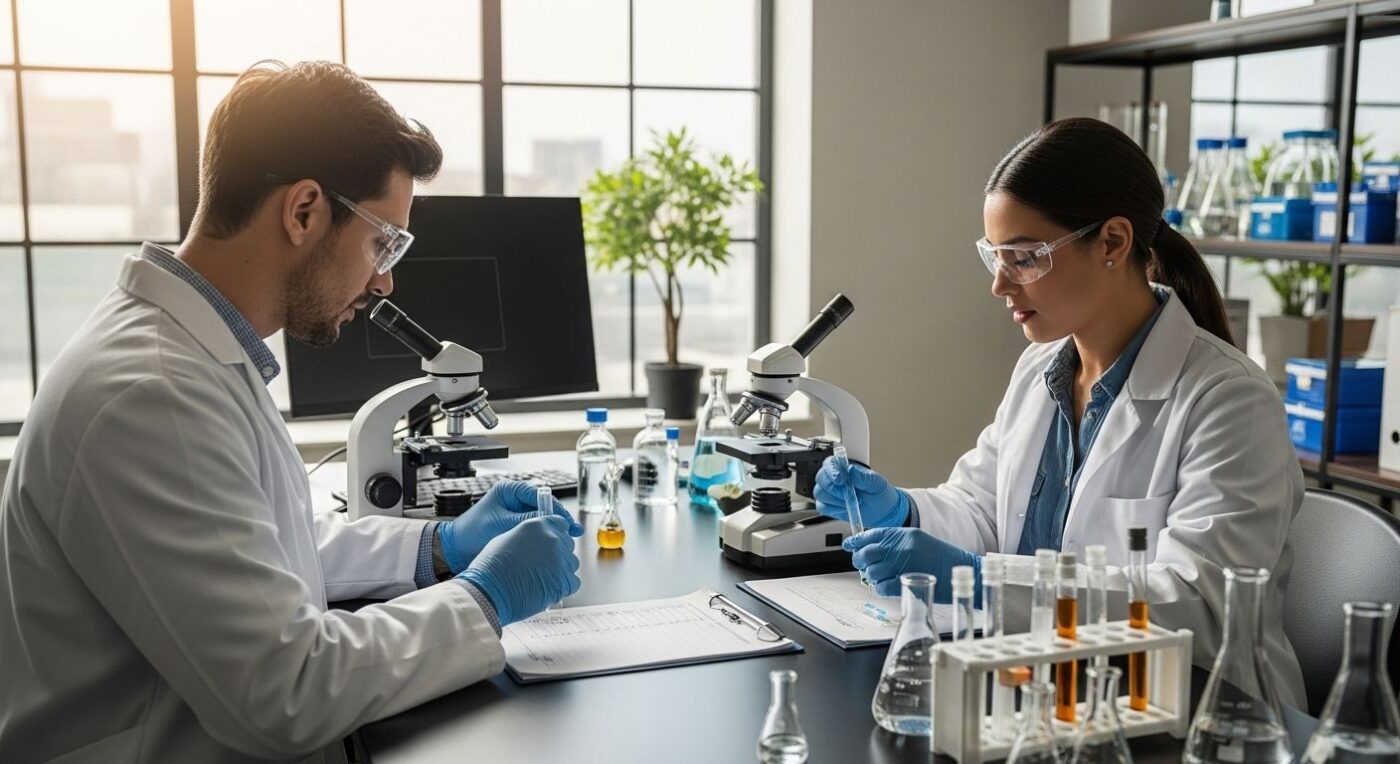Blog
8 Essential Tips for Your Lab Testing Checklist
Every cannabis producer knows lab testing matters for safety and compliance. Still, the stakes are even higher than most people realize. A single contaminated batch can lead to a costly recall and put consumer health at risk, with studies showing more than 15 percent of products in some markets fail their first test. Most think compliance is all about checking boxes, but the truth is that a strong lab testing checklist is your best defense against disaster and your ticket to trusted, high-quality products.
Table of Contents
- Understand Lab Testing Importance
- Identify Required Tests For Your Product
- Select An Accredited Laboratory
- Prepare Samples Correctly
- Maintain Clear Documentation
- Keep Track Of Testing Regulations
- Evaluate Test Results
- Understand Lab Reports For Future Improvements
Quick Summary
| Takeaway | Explanation |
|---|---|
| Lab testing ensures product safety. | Effective testing identifies harmful substances, ensuring cannabis product safety for consumers. |
| Identify specific tests for products. | Tailor testing protocols based on product type, intended use, and regulatory standards. |
| Select an accredited laboratory. | An accredited lab guarantees compliance and precise testing results for cannabis analysis. |
| Proper sample preparation is vital. | Following standardized protocols minimizes contamination and enhances test result reliability. |
| Regularly review lab reports for improvements. | Analyzing lab reports provides insights for operational improvements and better product quality. |
1: Understand Lab Testing Importance
Lab testing represents a critical foundation in quality assurance for cannabis products, ensuring consumer safety and product reliability. When developing your comprehensive lab testing checklist, understanding the core importance of systematic testing becomes paramount.
According to National Institutes of Health research, laboratory testing provides essential insights into product composition, potency, and potential contaminants. For cannabis products specifically, this means identifying crucial elements that directly impact user experience and health.
Key aspects of lab testing importance include:
- Confirming Product Safety: Detecting potential harmful substances like pesticides, heavy metals, and microbial contaminants
- Verifying Cannabinoid Profiles: Accurately measuring THC, CBD, and other cannabinoid concentrations
- Ensuring Consistent Quality: Establishing standardized testing protocols that maintain product integrity
A rigorous lab testing approach protects both consumers and manufacturers. By implementing comprehensive testing strategies, you create a transparent ecosystem that prioritizes scientific validation and consumer trust. Effective testing goes beyond mere compliance it represents a commitment to delivering high-quality, reliable cannabis products.
Professional testing laboratories utilize advanced analytical techniques like high-performance liquid chromatography (HPLC) and gas chromatography mass spectrometry (GC-MS) to provide precise, reproducible results. These sophisticated methods allow for detailed chemical analysis that traditional inspection methods cannot achieve.
For cannabis industry professionals, a meticulous lab testing checklist is not just a regulatory requirement but a fundamental aspect of responsible product development and distribution. By prioritizing thorough testing protocols, you demonstrate a dedication to safety, transparency, and consumer well-being.
2: Identify Required Tests for Your Product
Developing a comprehensive lab testing checklist demands a strategic approach to identifying the specific tests required for your cannabis product. Understanding the unique testing landscape ensures regulatory compliance and consumer safety.
According to CDC Laboratory Standards, product testing requirements vary significantly based on multiple critical factors. Manufacturers must conduct a thorough risk assessment to determine the precise testing protocols necessary for their specific cannabis product.
Key testing categories essential for cannabis products include:
- Potency Analysis: Measuring cannabinoid concentrations (THC, CBD, minor cannabinoids)
- Contaminant Screening: Detecting pesticides, heavy metals, microbial organisms
- Terpene Profiling: Identifying and quantifying aromatic compounds
- Residual Solvent Testing: Ensuring extraction process safety
The testing requirements can differ dramatically depending on several crucial factors:
- Product type (flower, concentrate, edible)
- Intended consumption method
- Extraction process utilized
- Jurisdictional regulatory standards
Professional laboratories employ advanced analytical techniques to provide comprehensive product assessments. These methods include gas chromatography, mass spectrometry, and high-performance liquid chromatography, which enable precise chemical analysis beyond basic visual inspection.
Regulatory compliance represents more than a legal obligation it is a fundamental commitment to consumer safety and product quality. By meticulously identifying and executing the appropriate tests, manufacturers demonstrate their dedication to transparency and responsible production.
Remember that testing requirements are not static. Staying informed about evolving regulatory standards and emerging scientific research is crucial for maintaining a robust and effective lab testing strategy.
3: Select an Accredited Laboratory
Selecting an accredited laboratory represents a pivotal decision in your lab testing checklist. The right laboratory partner ensures precise, reliable results that meet stringent industry standards and regulatory requirements.
According to ISO 15189:2022 standards, laboratory accreditation demonstrates a commitment to consistent quality and professional scientific practice. Choosing an accredited lab goes beyond mere compliance it signifies a dedication to precision and excellence.
Critical considerations when selecting a laboratory include:
- Accreditation Status: Verify ISO 17025 or state-specific cannabis testing certifications
- Specialized Equipment: Advanced analytical instruments for comprehensive testing
- Cannabis Industry Experience: Proven track record in cannabis product analysis
- Turnaround Time: Efficient processing without compromising analytical accuracy
Key factors that distinguish top-tier laboratories involve more than technical capabilities. Look for partners who provide:
- Transparent reporting mechanisms
- Comprehensive test result documentation
- Clear communication protocols
- Consistent quality control processes
Professional laboratories utilize cutting-edge technologies like liquid chromatography, mass spectrometry, and gas chromatography to deliver nuanced, accurate product assessments. These sophisticated analytical methods enable detailed chemical profiling beyond basic screening.
Beyond technical prowess, an ideal laboratory partner understands the complex regulatory landscape of cannabis testing. They stay current with evolving standards, maintain rigorous documentation, and provide insights that extend beyond raw data.
Remember that your laboratory selection directly impacts product quality, regulatory compliance, and consumer trust. Invest time in thorough research, request comprehensive references, and prioritize laboratories demonstrating both technical excellence and industry-specific expertise.
4: Prepare Samples Correctly
Proper sample preparation stands as a critical component in your lab testing checklist, directly influencing the accuracy and reliability of analytical results. Meticulous handling can mean the difference between precise scientific insight and potentially misleading data.
According to Scientific Research on Sample Integrity, sample preparation requires systematic attention to prevent contamination and ensure representative testing.
Essential steps for optimal sample preparation include:
- Standardized Collection Protocols: Use clean, calibrated collection equipment
- Proper Storage Conditions: Maintain appropriate temperature and environmental controls
- Minimize Handling: Reduce potential contamination through limited physical interaction
- Accurate Labeling: Document sample origin, collection date, and unique identifiers
Professional sample preparation demands careful consideration of multiple factors:
- Preservation techniques specific to cannabis product type
- Potential chemical degradation risks
- Homogeneity of the sample
- Compliance with laboratory-specific submission guidelines
Technical considerations extend beyond basic handling. Different cannabis products require unique preparation strategies. Concentrates, flower, and edibles each present distinct challenges in maintaining sample integrity during the testing process.
Advanced laboratories recommend using specialized tools like sterile containers, precision weighing equipment, and temperature-controlled storage solutions. These methods minimize variability and ensure that test results reflect the true chemical composition of the original sample.
Remember that sample preparation is not a one-size-fits-all process. Each product type demands a nuanced approach, understanding its specific chemical characteristics and potential degradation mechanisms. Investing time in proper preparation ultimately yields more reliable, reproducible scientific insights.
5: Maintain Clear Documentation
Documentation represents the backbone of a robust lab testing checklist, providing a critical framework for transparency, reproducibility, and regulatory compliance. Systematic record-keeping transforms raw data into a comprehensive narrative of scientific investigation.
According to Laboratory Control Record Standards, comprehensive documentation is essential for maintaining the integrity of scientific processes and ensuring traceability of test results.
Key documentation elements that demand meticulous attention include:
- Sample Identification: Unique tracking numbers for each sample
- Testing Protocols: Detailed procedure descriptions
- Equipment Calibration Records: Maintenance and performance logs
- Raw Test Results: Unmodified original data
Effective documentation strategies encompass multiple critical components:
- Consistent formatting across all records
- Digital and physical backup systems
- Clear chronological organization
- Secure storage mechanisms
Professional laboratories recognize that documentation extends beyond simple record-keeping. It serves as a legal safeguard, quality control mechanism, and scientific reference point. Electronic documentation systems now offer advanced features like timestamp tracking, automatic version control, and encrypted storage.
The cannabis testing industry demands extraordinary precision. Every document must reflect the complex chemical analysis performed, capturing nuanced details that could impact product safety and regulatory compliance. This means creating comprehensive records that are both scientifically rigorous and legally defensible.
Remember that documentation is not a bureaucratic exercise but a fundamental scientific practice. Well-maintained records protect manufacturers, consumers, and the broader scientific community by establishing a transparent, verifiable testing ecosystem.
6: Keep Track of Testing Regulations
Navigating the complex landscape of testing regulations requires a proactive, systematic approach. Regulatory compliance is not a static condition but an ongoing commitment to maintaining the highest standards of scientific and legal integrity.
According to FDA Laboratory Regulation Guidelines, understanding and implementing current regulatory standards is fundamental to reliable laboratory operations.
Key regulatory considerations for cannabis testing include:
- State-Specific Requirements: Unique regulations per jurisdiction
- Frequency of Compliance Updates: Regular monitoring of changing standards
- Comprehensive Testing Mandates: Specific contaminant and potency screening protocols
- Documentation Compliance: Maintaining detailed, accessible records
Strategic approaches to regulatory tracking involve:
- Subscribing to industry regulatory newsletters
- Participating in professional cannabis testing associations
- Attending periodic regulatory training sessions
- Maintaining direct communication with regulatory bodies
The cannabis testing industry operates in a rapidly evolving regulatory environment. Jurisdictions continuously refine testing requirements, reflecting advances in scientific understanding and public health considerations. Professionals must remain agile, anticipating and adapting to emerging regulatory frameworks.
Technological solutions now offer sophisticated regulatory tracking tools. These platforms provide real-time updates, automated compliance alerts, and comprehensive regulatory intelligence. Leveraging such technologies transforms regulatory compliance from a reactive task to a strategic advantage.
Remember that regulatory knowledge is not optional it is a fundamental responsibility. Staying informed protects your organization, ensures product safety, and maintains the integrity of the cannabis testing ecosystem.
7: Evaluate Test Results
Evaluating test results represents a critical phase in your lab testing checklist, requiring analytical precision, systematic review, and comprehensive interpretation. The goal extends beyond simple data collection to generating meaningful insights that inform product quality and safety.
According to Laboratory Test Result Management Guidelines, consistent and clear reporting is fundamental to avoiding misinterpretation and ensuring actionable scientific understanding.
Critical evaluation strategies involve:
- Comparative Analysis: Benchmarking results against established standards
- Statistical Significance: Determining meaningful variations
- Trend Identification: Recognizing patterns across multiple test runs
- Outlier Investigation: Examining unexpected or anomalous results
Key considerations during result evaluation include:
- Verifying instrument calibration
- Cross-referencing multiple testing methods
- Assessing potential sources of measurement variability
- Documenting comprehensive interpretative notes
Professional laboratories employ sophisticated statistical techniques to validate test results. This includes calculating confidence intervals, conducting hypothesis testing, and utilizing advanced data visualization tools that transform raw numbers into comprehensible insights.
The cannabis testing industry demands extraordinary rigor. Results must not only meet regulatory requirements but also provide a nuanced understanding of product composition, potential contaminants, and chemical profiles. This requires a holistic approach that combines technical expertise with scientific critical thinking.
Remember that result evaluation is more than mathematical calculation it is an interpretative process that bridges raw data and meaningful scientific understanding. Careful, systematic review protects consumer safety and maintains the integrity of the testing ecosystem.
8: Understand Lab Reports for Future Improvements
Lab reports are not merely documentation artifacts but powerful tools for continuous improvement in your lab testing checklist. By critically analyzing these comprehensive documents, organizations can transform raw data into strategic insights that drive quality enhancement and operational excellence.
According to NIH Laboratory Reporting Research, systematic review of laboratory reports can significantly reduce future testing discrepancies and improve overall workflow efficiency.
Key elements for transformative lab report analysis include:
- Performance Metrics: Tracking consistent testing parameters
- Trend Identification: Recognizing recurring patterns or anomalies
- Methodological Evaluation: Assessing testing procedure effectiveness
- Continuous Learning: Using reports as educational tools
Strategic approaches to leveraging lab reports involve:
- Creating comparative databases of historical test results
- Implementing regular interdepartmental review sessions
- Developing standardized interpretation protocols
- Investing in data visualization technologies
Professional laboratories recognize that each report represents more than a snapshot of current testing conditions. These documents serve as comprehensive narratives that capture the complex interactions between testing methodologies, equipment performance, and scientific precision.
In the cannabis testing industry, where regulatory standards continuously evolve, understanding lab reports becomes even more critical. Reports provide insights into product consistency, potential improvement areas, and emerging testing technologies.
Remember that lab reports are living documents. They are not static records but dynamic tools that, when properly analyzed, can drive significant improvements in testing protocols, product quality, and organizational performance.
Below is a comprehensive table summarizing the essential tips, main actions, and benefits from the article to help you strengthen your cannabis lab testing checklist.
| Key Tip | Main Action/Focus | Core Benefit |
|---|---|---|
| Understand Lab Testing Importance | Learn why systematic testing is critical | Ensures consumer safety, product reliability, and compliance |
| Identify Required Tests for Your Product | Determine specific tests based on product/regulations | Achieves regulatory compliance and addresses product uniqueness |
| Select an Accredited Laboratory | Choose ISO/state-certified labs with advanced technology | Ensures trustworthy, precise, and reliable test results |
| Prepare Samples Correctly | Follow standardized protocols and avoid contamination | Yields accurate, representative, and reproducible results |
| Maintain Clear Documentation | Keep detailed, organized records of all processes | Improves traceability and supports legal/scientific defensibility |
| Keep Track of Testing Regulations | Stay updated with evolving state and federal laws | Maintains ongoing compliance and regulatory advantage |
| Evaluate Test Results | Analyze results, investigate outliers, benchmark standards | Identifies quality issues and validates scientific integrity |
| Understand Lab Reports for Improvements | Use reports for performance metrics and trend analysis | Drives continuous improvement and higher product quality |
Get Reliable, Lab-Tested Vapes That Put Your Safety First
You want transparency and guaranteed quality. After reading about the complexities of lab testing and the importance of accurate documentation, you know just how critical it is to have trustworthy products. Many cannabis vapes lack clear proof of lab results or clear chains of accountability. As highlighted by the tips in the article, protecting your safety starts with choosing the right brand and understanding the results behind what you buy.

Find peace of mind with Shorties Disposable. Every vape on our site features detailed, verified lab reports and clear product information, so you never have to wonder what you are inhaling. You get instant access to lab results, authenticity checks, and a seamless shopping experience. Trust your next purchase to our commitment to lab-verified quality and safety. Make the smart choice for your health and shop now while supplies last.
Frequently Asked Questions
What is the importance of lab testing for cannabis products?
Lab testing is crucial for ensuring consumer safety and product reliability. It helps identify harmful substances, verifies cannabinoid concentrations, and establishes quality standards.
What are the key tests required for cannabis products?
Essential tests include potency analysis for cannabinoids, contaminant screening for pesticides and heavy metals, terpene profiling, and residual solvent testing based on the product type and intended use.
How can I select an accredited laboratory for testing?
Choose a laboratory that has ISO 17025 or state-specific cannabis testing certifications, advanced analytical equipment, industry experience, and transparent reporting practices to ensure reliable testing results.
Why is proper sample preparation critical in lab testing?
Proper sample preparation minimizes contamination risks and ensures that test results accurately reflect the true chemical composition of the cannabis product, which is essential for reliable analysis.
Recommended
- Optimize Your Vape Maintenance Workflow for 2025 Success
- How to Explain Vape Flavors
- Understanding the Role of Safety Seals in Vapes
- Shorties Disposable Lava Cake

